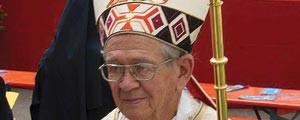News / National
Late Bishop remembered for confronting Mugabe
3 hrs ago | Views

The late Archbishop of Bulawayo, Henry Karlen, was remembered for his courageous stance against the mass killings in Matabeleland during the 1980s, at a memorial service held on Saturday by Ibhetshu LikaZulu. The service honoured Karlen's legacy as a staunch advocate for the oppressed during one of the darkest periods in Zimbabwe's history.
Karlen, who passed away in 2012 at the age of 90, is remembered for his unwavering support of the victims of the Gukurahundi massacres, in which an estimated 20,000 civilians were killed by the government's North Korean-trained Fifth Brigade, allegedly sent to quell dissidents in Matabeleland and the Midlands. Karlen, who had been transferred to Africa as a missionary in 1951, became an outspoken critic of the violence under former President Robert Mugabe.
Moses Mzila Ndlovu, former National Healing and Reconciliation minister, praised Karlen for his brave actions in standing up for the people of Matabeleland, despite the racial and political divides of the time.
"Karlen overcame racial divide by standing up for the black people in Matabeleland, which he had no business to do with, but because he was a missionary," said Ndlovu. "He stood up and defended the people in Matabeleland more than other black people that were supposed to defend them when innocent and unarmed people were being massacred by the late former President Robert Mugabe."
Ndlovu went on to commend Karlen for his commitment to justice, saying the Archbishop confronted Mugabe directly, urging him to stop the carnage that was devastating the region.
Legal practitioner Nikiwe Ncube highlighted Karlen's role in documenting the atrocities committed during the Gukurahundi era, noting that the Catholic Commission for Justice and Peace's report was the only comprehensive record of the killings.
"It is the only document that we have. He is a man who risked his life by confronting the late Mugabe. He drove through communities in Matabeleland compiling data regarding the atrocities," said Ncube.
Karlen's actions were not only a testament to his courage but also his deep empathy for the suffering of the people in Matabeleland. The Archbishop's willingness to speak out at great personal risk earned him the admiration of many, including human rights activist Joseph Nkatazo, who spoke about the lessons learned from Karlen's example.
Karlen was appointed the first Archbishop of Bulawayo in 1994, and was affectionately known as the "Father of Bulawayo Diocese" for his work in expanding the Roman Catholic Church in the region. His legacy lives on through his efforts to fight for justice and stand in solidarity with the marginalized, and he was laid to rest at Athlone Cemetery in Bulawayo.
Despite his outspoken advocacy for the people of Matabeleland, former President Mugabe never publicly apologized for the Gukurahundi massacres during his lifetime, a fact that remains a source of unresolved pain for many in the affected communities. Karlen's courage in confronting Mugabe continues to serve as an example of moral leadership in the face of political oppression.
Karlen, who passed away in 2012 at the age of 90, is remembered for his unwavering support of the victims of the Gukurahundi massacres, in which an estimated 20,000 civilians were killed by the government's North Korean-trained Fifth Brigade, allegedly sent to quell dissidents in Matabeleland and the Midlands. Karlen, who had been transferred to Africa as a missionary in 1951, became an outspoken critic of the violence under former President Robert Mugabe.
Moses Mzila Ndlovu, former National Healing and Reconciliation minister, praised Karlen for his brave actions in standing up for the people of Matabeleland, despite the racial and political divides of the time.
"Karlen overcame racial divide by standing up for the black people in Matabeleland, which he had no business to do with, but because he was a missionary," said Ndlovu. "He stood up and defended the people in Matabeleland more than other black people that were supposed to defend them when innocent and unarmed people were being massacred by the late former President Robert Mugabe."
Ndlovu went on to commend Karlen for his commitment to justice, saying the Archbishop confronted Mugabe directly, urging him to stop the carnage that was devastating the region.
"It is the only document that we have. He is a man who risked his life by confronting the late Mugabe. He drove through communities in Matabeleland compiling data regarding the atrocities," said Ncube.
Karlen's actions were not only a testament to his courage but also his deep empathy for the suffering of the people in Matabeleland. The Archbishop's willingness to speak out at great personal risk earned him the admiration of many, including human rights activist Joseph Nkatazo, who spoke about the lessons learned from Karlen's example.
Karlen was appointed the first Archbishop of Bulawayo in 1994, and was affectionately known as the "Father of Bulawayo Diocese" for his work in expanding the Roman Catholic Church in the region. His legacy lives on through his efforts to fight for justice and stand in solidarity with the marginalized, and he was laid to rest at Athlone Cemetery in Bulawayo.
Despite his outspoken advocacy for the people of Matabeleland, former President Mugabe never publicly apologized for the Gukurahundi massacres during his lifetime, a fact that remains a source of unresolved pain for many in the affected communities. Karlen's courage in confronting Mugabe continues to serve as an example of moral leadership in the face of political oppression.
Source - southern eye






























